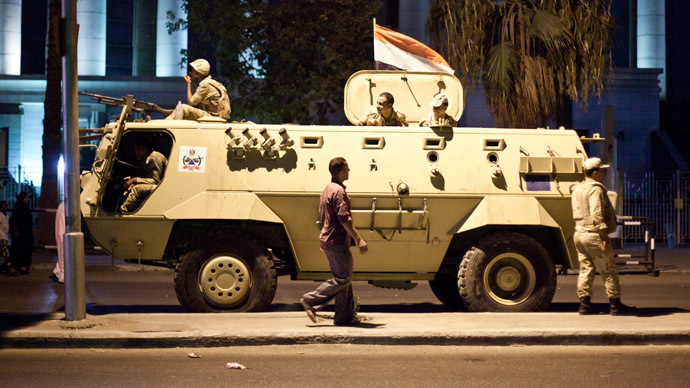Obama’s hands tied over Egypt military aid cuts

Obama has little power to cancel military aid to Egypt, although it has become increasingly obvious the Egyptian government is far from democratic and willing to use force, activist Sarah Marusek told RT.
Congress will not allow President Barack Obama to cancel US aid to Egypt, while there is also no way to exert their influence in the Middle East as Obama’s hypocrisy has cost him influence in the region, Marusek says. While the EU is considering suspending €5bn in aid to Egypt, the US has its hands tied when it comes to canceling aid, as it is US firms who are not going to be paid.
RT:Do you think that your message is going to get through? Do you think the US will anytime soon stop that aid or not?
Sarah Marusek: I definitely think that the message will get through in a sense that the US is very confused. They are listening to people, they are learning about the situation, but their hands are tied. The aid has already been given.
The way that the aid works is very peculiar, in my view. It is on a credit system, and the Egyptian army has already placed the order for other years to come because they place orders above and beyond whatever we allocate. This means that if the United States government cancels the aid then the US companies are the ones who are not going to be paid. In our economy that is struggling, that is not going to be fine for the American people. There are many of us, including myself and those who showed up for the protests in New York City on Friday and those who were protesting on Sunday in San Francisco who demand the government to take action and cut the military aid.
We do know and we do care, but the sad fact is most Americans are
quite ignorant not only about what is going on in Egypt but our
role in it. It is very unlikely that the US will reconsider its
position on aid to Egypt. Perhaps there are other things that
they could do but right now it’s looking very bleak and as you
see the generals and the politicians who are in power right now,
the unelected government, the way they talk about their meetings
with the United States. They are so dismissive, they say ‘we
used forceful language with the United States to tell them that
this is what we are doing and we are not interested in any of
your opinions, we are not going to negotiate, we are in
charge.’ This shows that this is not a democratic government
in power and they are willing to use force to come to some sort
of solution.

RT:Did you take some comfort at all from that Barak Obama said ‘this is not going to be business as usual’. What do they mean by that?
SM: There are other things that the US can do, pressuring
some of Egypt’s allies. They think they might have some leverage
on Saudi Arabia, I doubt that.
Also the United States understands that the Europeans may have some more leverage, so maybe he is going to try to persuade them to show a little bit more of a heavy hand.
I just don’t see how president Obama, especially with the Congress that is not going to cancel the military aid. Republicans are not up for this. The only people who are up for it are the Libertarians and a few mavericks like John McCain and a few democrats, but generally it’s out of Obama’s hands. Obama’s strategy in the Middle East has given him very little power, because he has shown no principle, he has shown no clarity, he backed dictators, he backed violence when it suits him and then he goes against some other regimes when it suits him as well. Right now his hypocrisy has cost him influence in the region.
RT:Today Egypt’s military chief, General el-Sisi said that the army has no intention of seizing power and even called for Islamists to potentially be included in the countries future political system. What has prompted this message?
SM: It is completely contradictory to what is happening on the ground. Obviously the army is in power right now. The provisional government has completely no say on what is going on. It’s the street that is deciding the battle and it is a bloody battle.
RT:Who has been carrying out the fight here? Who is against whom?
SM: This is a good question and as we saw in the revolution back in 2011 there are many thugs in Egypt who got paid to do the bidding of whoever has the money. We don’t know if it is the military fighting, we don’t know if it is the police, we don’t know if it’s the paid thugs, we don’t know if it’s the Muslim Brotherhood. As it seems, the Muslim Brotherhood are the victims, or the supporters of Morsi. There are Christians out there. There are people who are against the Muslim Brotherhood but are pro-democracy, which shows the struggle for democracy in Egypt, it is also a struggle over the identity of Egypt. Will Egypt allow a pluralist society where Islamists are welcomed or will they try to ban the Brotherhood as it has been mentioned on Sunday? This is really the struggle that is going to be the most urgent and important thing that has happened to Egypt, even more important than what happened two years ago.
The statements, views and opinions expressed in this column are solely those of the author and do not necessarily represent those of RT.












